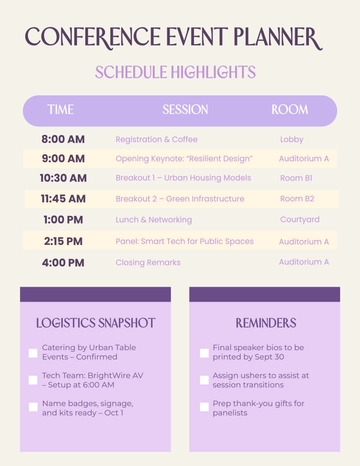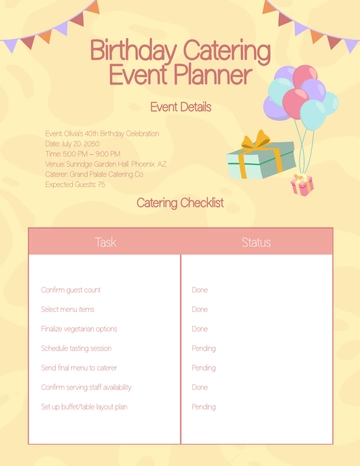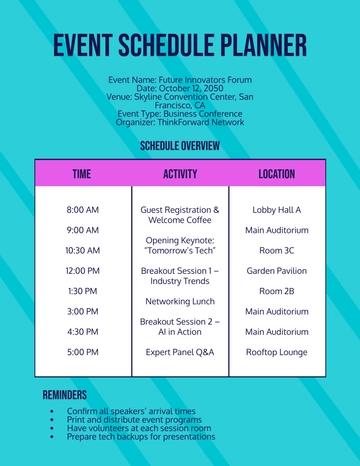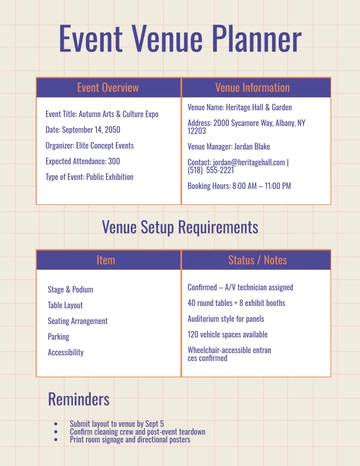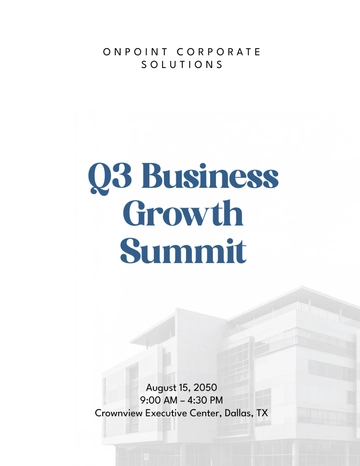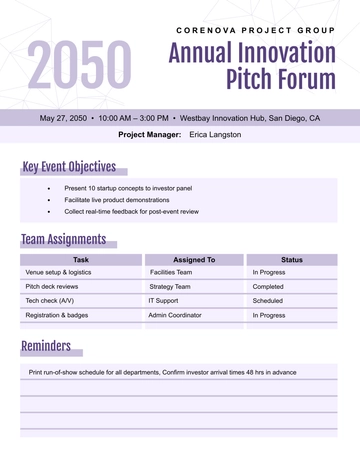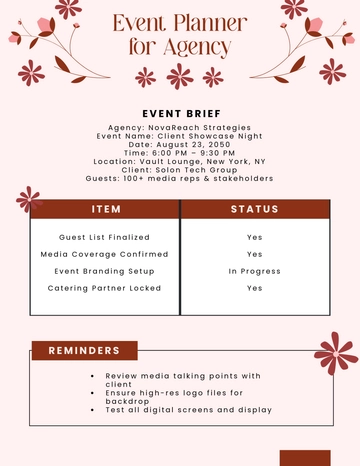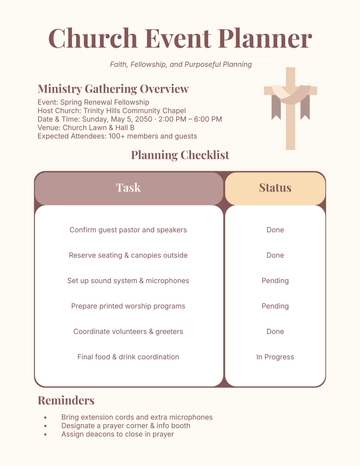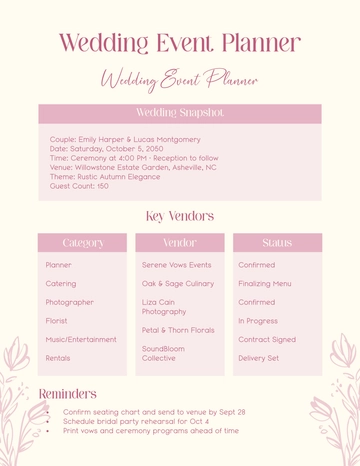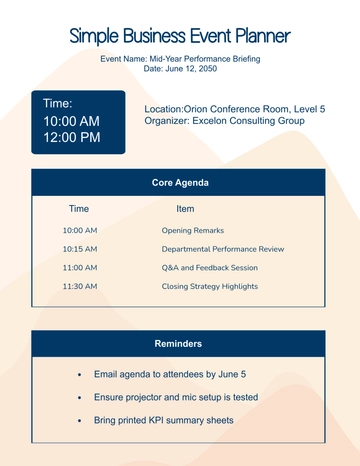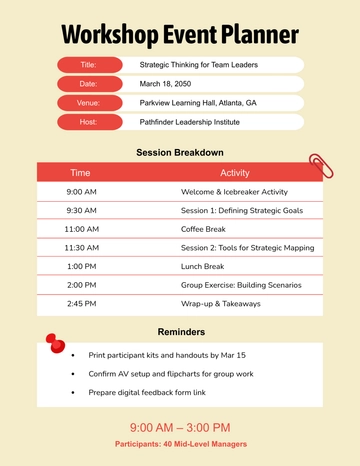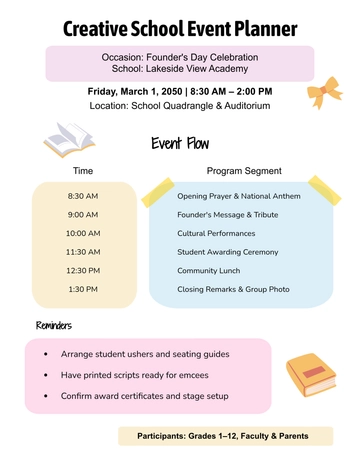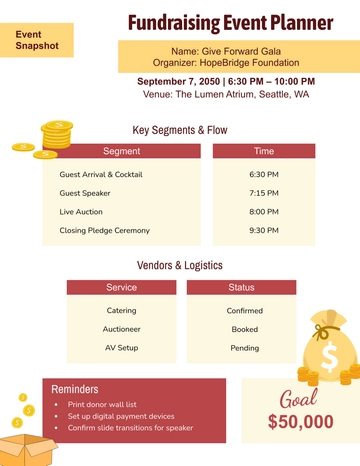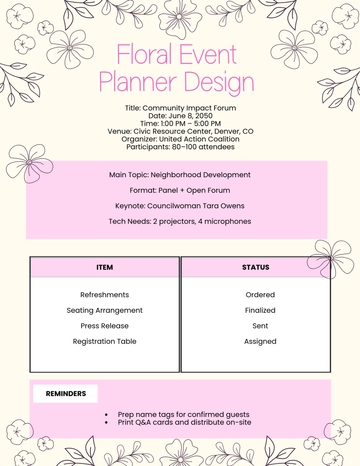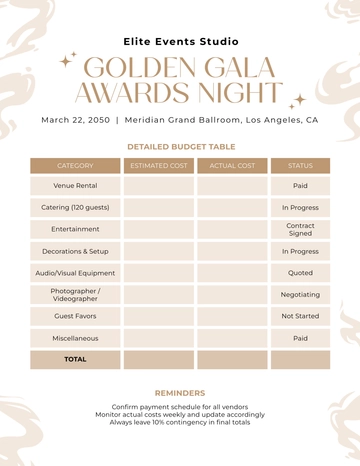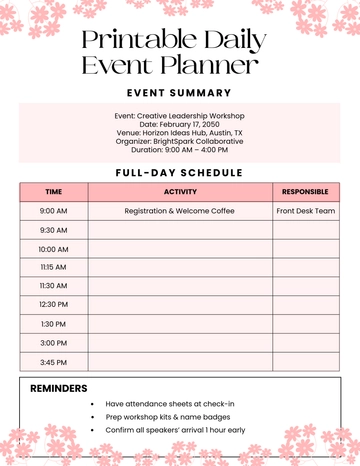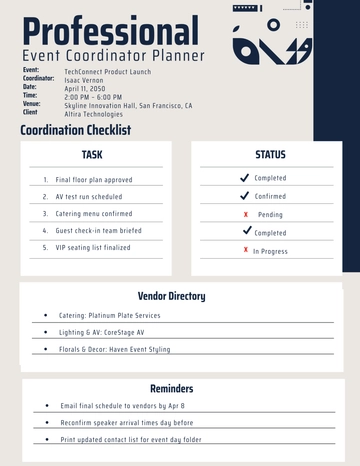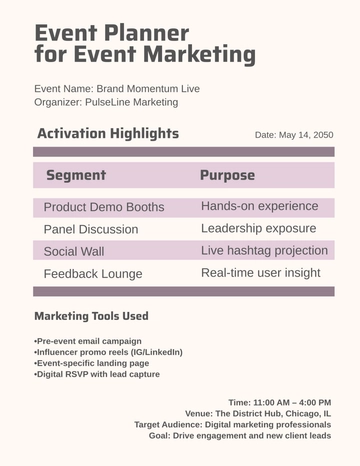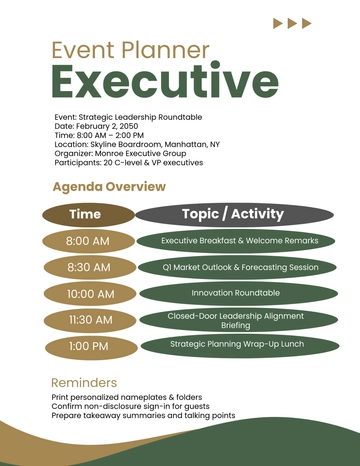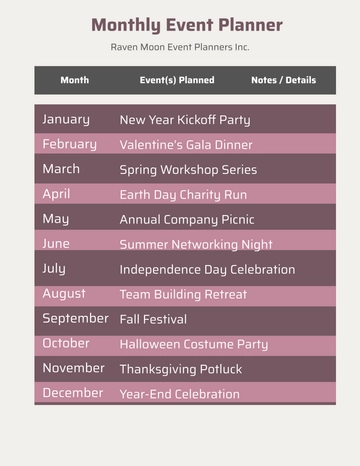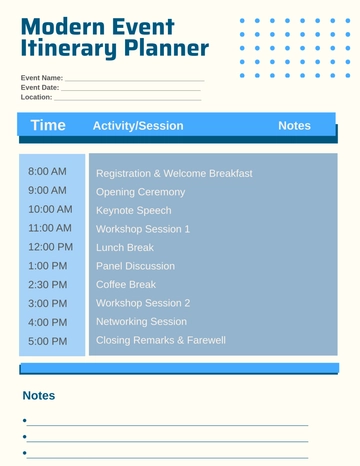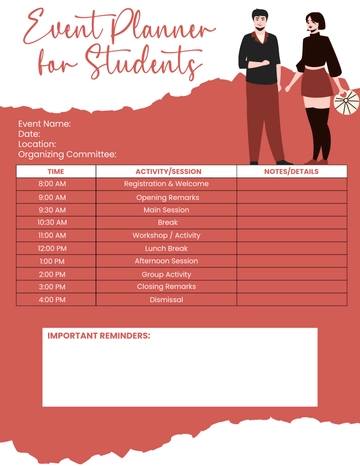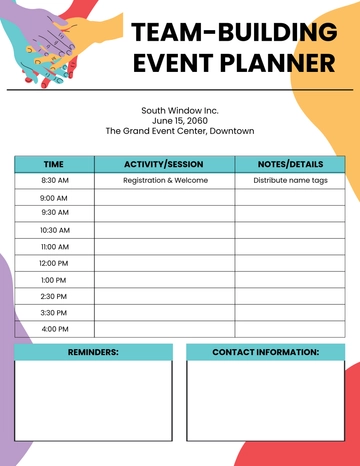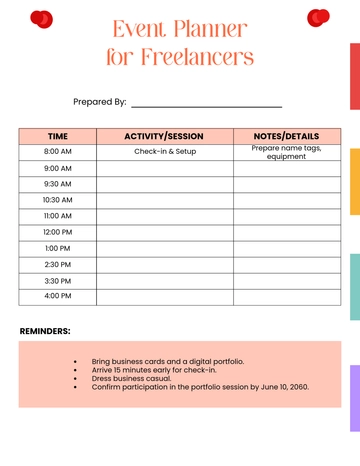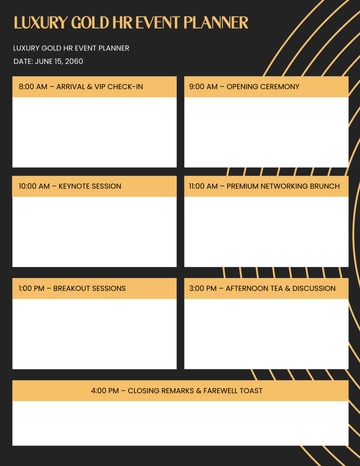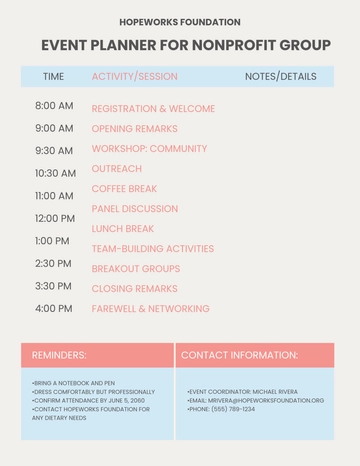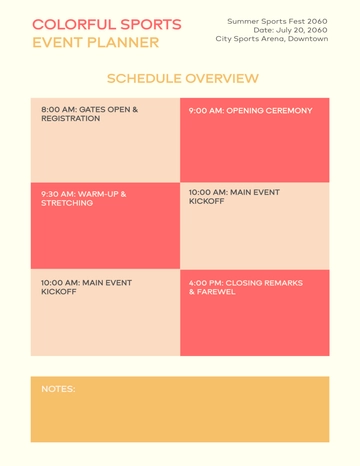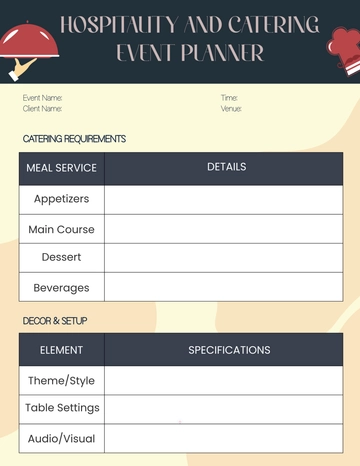Free Event Planner Marketing Plan
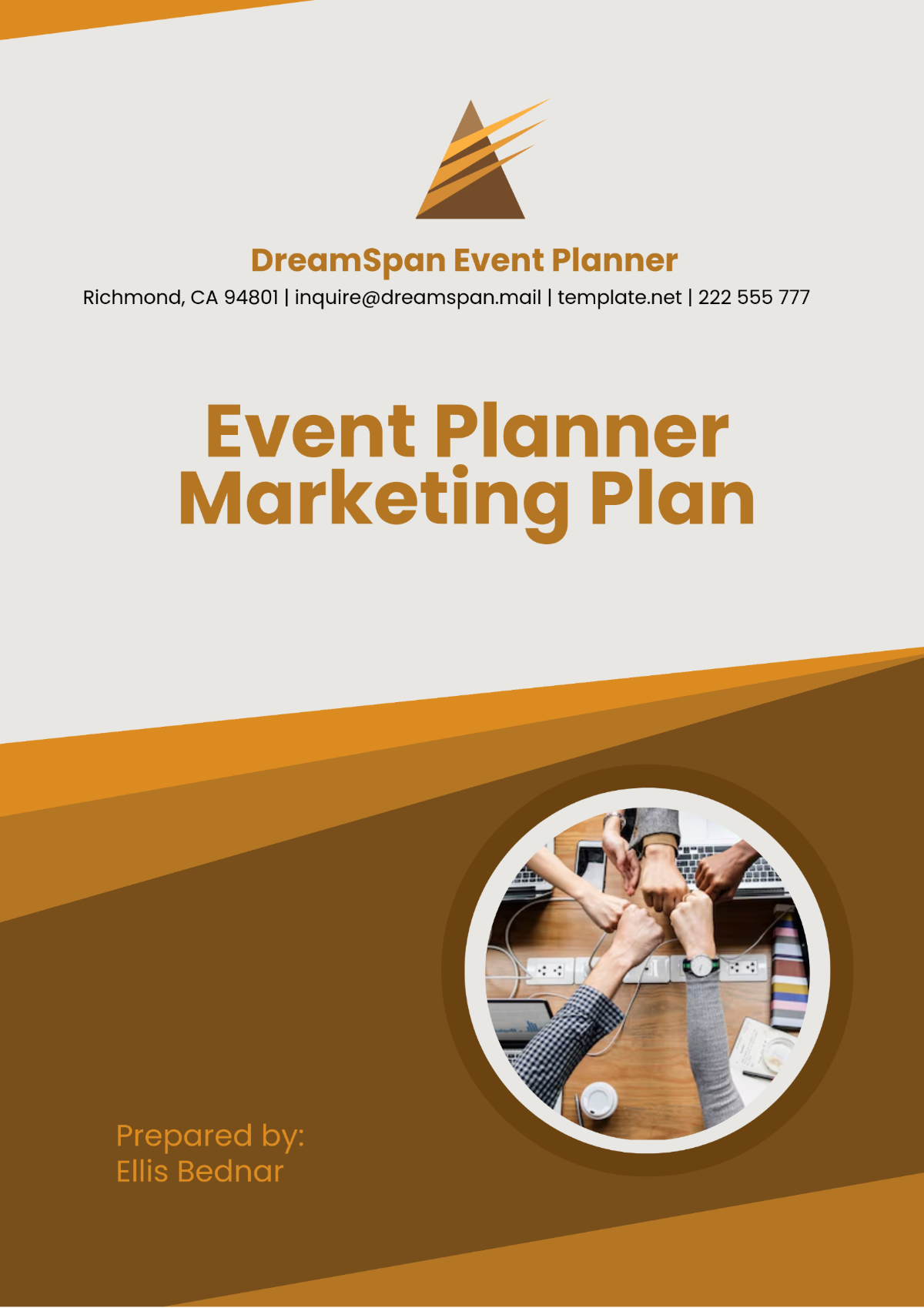
I. Executive Summary
[Your Company Name] is positioned to be a premier provider of event planning services, specializing in weddings, corporate functions, social gatherings, and community events. With a focus on creating memorable experiences tailored to clients' unique needs, this marketing plan outlines strategies to enhance brand visibility and attract a diverse range of clients. By leveraging a multi-channel marketing approach, [Your Company Name] aims to drive engagement, expand its customer base, and establish itself as a trusted leader in the event planning industry.
This plan will identify key target markets, segmenting them by demographics, interests, and geographic regions, allowing [Your Company Name] to tailor its marketing efforts for maximum impact. The strategy includes both digital and traditional marketing channels, with an emphasis on social media, search engine optimization (SEO), paid advertising, and email campaigns, as well as event partnerships, public relations, and networking events. By combining these tactics with a commitment to exceptional client service, [Your Company Name] aims to foster lasting relationships, increase lead generation, and enhance overall brand loyalty. Through these efforts, the company seeks to achieve significant growth and solidify its presence in the competitive event planning market.
II. Market Analysis
1. Industry Overview
The event planning industry is a dynamic and evolving market in the U.S., with consistent demand for services across various sectors, including corporate functions, weddings, trade shows, product launches, and private celebrations. According to recent reports, the U.S. event planning market is projected to experience steady growth, driven by increased corporate spending, rising consumer interest in customized events, and a resurgence in in-person gatherings post-pandemic. To maintain competitiveness, [Your Company Name] must stay updated on current market trends, such as the growing demand for sustainable and eco-friendly event solutions, the integration of technology (e.g., virtual or hybrid events), and personalized client experiences.
Additionally, a deep understanding of consumer behavior is crucial. Modern clients often seek planners who can manage everything from concept creation to day-of coordination while ensuring seamless execution. Flexibility, creativity, and attention to detail are essential qualities in today’s market. The rising importance of social media and digital platforms in shaping event experiences also suggests that event planners must adopt innovative marketing tactics and provide services that cater to tech-savvy audiences.
2. Target Audience
The primary target audience for [Your Company Name] includes corporate clients seeking to plan conferences, team-building retreats, product launches, and holiday parties. These clients value professionalism, organizational skills, and creativity in delivering high-impact events that align with their brand. Another significant audience consists of couples planning weddings, who seek a planner with the ability to create personalized, emotionally resonant, and visually stunning celebrations. In this segment, the focus is on delivering a once-in-a-lifetime experience.
The secondary target audience includes individuals planning personal events such as birthdays, anniversaries, and reunions, where intimate, customized experiences are highly sought after. Non-profit organizations and government entities represent an additional target audience, often requiring event planning services for charity galas, fundraisers, political events, and community programs. These clients typically prioritize budget-friendly solutions, transparency, and a planner’s ability to manage logistics on a tight schedule.
3. Competitor Analysis
The event planning industry is highly competitive, with competitors ranging from small boutique planners to large-scale firms that offer a full spectrum of services. Local event planners often attract clients through personalized service, intimate knowledge of regional venues, and competitive pricing. On the other hand, larger firms may dominate in terms of resources, brand recognition, and the ability to handle large-scale or high-profile events.
Key differentiators include service specialization, pricing models, and reputation. Some planners may focus on niche markets, such as luxury weddings or corporate retreats, while others offer a broader range of services. Client reviews and testimonials also play a significant role in influencing decision-making, as word-of-mouth referrals and online ratings are critical in the event planning industry. Additionally, the ability to offer unique services—such as virtual or hybrid event solutions, eco-friendly options, or exclusive partnerships with vendors—can provide [Your Company Name] a competitive edge. To thrive, the company will need to capitalize on its strengths, refine its service offerings, and ensure that it remains adaptable to market demands and trends.
III. Marketing Goals and Objectives
Setting clear and measurable goals is essential to driving the success of [Your Company Name]'s marketing initiatives. These objectives will focus on expanding brand reach, increasing client acquisition, and enhancing online engagement.
Increase brand awareness by 25% within one year
Gain 20 new corporate clients in the next 12 months
Boost website traffic by 30% over the next 6 months
IV. Marketing Strategies
1. Branding
Establishing a powerful and cohesive brand identity is fundamental to differentiating [Your Company Name] in the competitive event planning market. The brand should evoke professionalism, creativity, and trust, aligning with the values of target clients. A memorable logo and consistent color schemes across all platforms will reinforce brand recognition. This includes everything from business cards and marketing materials to the website and social media profiles. Additionally, the company’s messaging should clearly communicate its unique value proposition, emphasizing expertise, attention to detail, and personalized service. A professional website serves as the brand’s online home, showcasing past events, client testimonials, and a compelling portfolio that captures the essence of [Your Company Name]’s capabilities.
2. Digital Marketing
a. Website Optimization
The company’s website should be optimized not just for aesthetics but for functionality and discoverability. This includes ensuring the site is SEO-friendly by incorporating relevant keywords, meta tags, and descriptions, making it easy for potential clients to find through search engines. User experience (UX) is key—navigation must be intuitive, with clear calls-to-action (CTAs) that encourage visitors to inquire, schedule consultations, or download resources. A blog can also serve as a valuable tool, offering tips on event planning, showcasing trends, and driving organic traffic through relevant, search-optimized content.
b. Social Media
Social media platforms offer powerful tools for engaging directly with target audiences. [Your Company Name] should maintain a presence on platforms like Instagram, Facebook, and LinkedIn, as these are ideal for visually showcasing past events and connecting with both corporate and individual clients. Developing a content calendar ensures consistent posting and interaction, allowing the company to build its online community, share behind-the-scenes looks at events, offer promotions, and engage with followers through comments, polls, and stories. Paid social media campaigns can further expand reach by targeting specific demographics interested in event services.
3. Traditional Marketing
a. Networking Events
In-person interactions remain a critical part of building relationships within the event planning industry. [Your Company Name] should actively participate in local business networking events, trade shows, wedding expos, and industry conferences. These venues provide opportunities to connect with potential clients, partner with vendors, and build relationships with influencers who can refer future business. Offering workshops or speaking at these events can position [Your Company Name] as an industry expert, further establishing credibility and trust with attendees.
b. Print Advertising
Though digital marketing dominates, print advertising continues to offer valuable touchpoints, especially in local markets. Advertising in local newspapers, event magazines, and targeted brochures can help [Your Company Name] reach a wider and more diverse audience. A visually appealing print ad, showcasing recent successful events or highlighting special offers, can attract both corporate and personal clients. Additionally, distributing flyers, brochures, and business cards at local venues and community centers can increase brand awareness in key geographic locations.
V. Marketing Tactics and Implementation
Effective marketing requires a clear roadmap for executing strategies. This section outlines the specific actions [Your Company Name] will take to achieve its marketing goals, detailing the tools, platforms, and timelines for each tactic. By breaking down each strategy into actionable steps—whether through digital channels, traditional marketing, or partnerships—[Your Company Name] can ensure consistent brand visibility, drive client engagement, and track progress toward measurable results.
Activity | Timeline | Budget |
|---|---|---|
Website Redesign | Q1 2024 | $5,000 |
Social Media Campaign | Monthly | $1,000/month |
Print Ads | Bi-Annual | $1,500 |
Networking Events | Quarterly | $500/event |
VI. Monitoring and Evaluation
To ensure the success of [Your Company Name]'s marketing initiatives, it is crucial to regularly assess the effectiveness of implemented strategies. Utilizing analytics platforms, such as Google Analytics and social media insights, will provide valuable data on website traffic, user engagement, and campaign performance. These tools will help track key performance indicators (KPIs) like conversion rates, click-through rates, and overall ROI, enabling the company to gauge which tactics are resonating with the target audience. Additionally, gathering customer feedback through surveys and direct interactions will offer qualitative insights into client satisfaction and service effectiveness.
Based on these evaluations, [Your Company Name] must remain agile and willing to adjust its marketing plan. By analyzing trends and understanding client needs, the company can refine its strategies to enhance effectiveness and drive better results. Continuous improvement is essential in a dynamic market, ensuring that [Your Company Name] stays ahead of competitors and consistently meets client expectations while maximizing its marketing investments.
VII. Conclusion
The execution of this comprehensive marketing plan is pivotal for [Your Company Name] to achieve its goals of increasing visibility and attracting a diverse range of clients in the event planning industry. By focusing on well-defined branding, a robust digital presence, and effective traditional marketing strategies, [Your Company Name] will create a strong foundation for sustained growth. The alignment of marketing tactics with the evolving needs of the target audience ensures that the company can effectively reach potential clients and stand out in a competitive landscape.
Furthermore, continuous monitoring and evaluation will be integral to the success of this plan. By leveraging data analytics and customer feedback, [Your Company Name] can make informed adjustments to its strategies, ensuring responsiveness to market trends and client expectations. Ultimately, this proactive approach not only strengthens [Your Company Name]'s market position but also fosters long-term relationships with clients, leading to increased referrals and repeat business that will contribute to overall success and sustainability.
- 100% Customizable, free editor
- Access 1 Million+ Templates, photo’s & graphics
- Download or share as a template
- Click and replace photos, graphics, text, backgrounds
- Resize, crop, AI write & more
- Access advanced editor
Elevate your marketing efforts with this Event Planner Marketing Plan Template from Template.net. This customizable and editable template provides a comprehensive structure for outlining your marketing strategies, target audience, and promotional activities. Fully editable in our Ai Editor Tool, you can modify each section to fit your specific goals, ensuring an effective and well-organized marketing plan for your event planning business.
You may also like
- Aesthetic Planner
- Hourly Planner
- Daily Planner
- Weekly Planner
- Monthly Planner
- Planners Yearly
- Event Planner
- Project Planner
- Calendar Planner
- Student Planner
- School Planner
- Teacher Planner
- Kawaii Planner
- Budget Planner
- Life Planner
- Meal Planner
- Study Planner
- Business
- Workout Planner
- Work Schedule Planner
- Party Planner
- Social Media Planner
- Baby Shower Planner
- Book Planner
- Planner Cover
- Debt Planner
- Desk Planner
- Diet Planner
- Family Planner
- Fitness Planner
- Goal Planner
- Health Planner
- Medical Planner
- Holiday Planner
- Homework Planner
- Itinerary Planner
- Journal Planner
- Personal Planner
- Route Planner
- Smart Goal Planner
- Travel Planner
- Wedding Planeer
